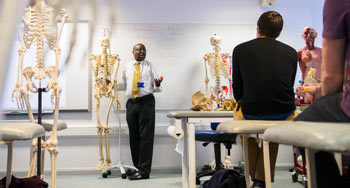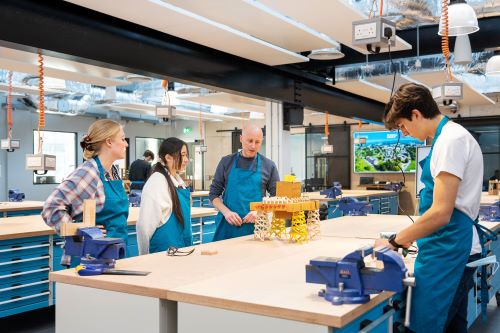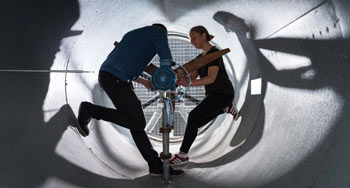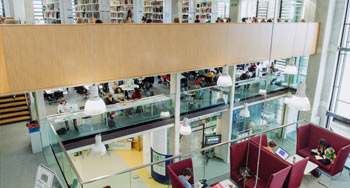Where do my University fees go?
Where do my fees go?
We recognise that you, our students, invest a great deal of your money, time and energy into the University, as part of your lifelong relationship with us.
Ours is a global organisation which helps students and staff contribute to society through education, research and knowledge exchange. We seek to use all of our resources, including fees, funding, capital and infrastructure, wisely, to fulfil our commitments to students, funders and partners - whilst ensuring the current and future success of the University. Each academic discipline plays a valuable part in the success of the University as a whole and funds are distributed carefully to ensure this is achieved. Financial decision making is scrutinised by the University Council and Senate, with student representation from the Students' Guild and the Students' Union.
Our goal is to give you exceptional value for money by ensuring:
- that your learning, teaching, support and engagement in knowledge creation, through research and scholarship, are well resourced to enable you to succeed academically on your chosen degree programme and professionally in your career
- that you can develop your potential further, through a rich extra-curricular experience that complements your academic programme
- that your University is nationally and internationally competitive with an excellent reputation, both now and in the future. This adds value to your degree when you graduate and for your whole career, gives a continuing sense of pride and allows you to see the value of your commitment
We believe that through continual hard work and diligence, we have invested your fee wisely in order to provide the very best value for money.
Below is a breakdown of where and how your University fee was spent for the academic year 2022/2023. UK tuition fees are set by the UK Government and are the same across all disciplines. University fees make up a significant proportion of our income but there are other sources too. You can find out more about these in our Annual Report for 2022/23.
The figures below represent the latest information available (i.e. academic year 2022/23).
Teaching and Learning

At the heart of all we do at the University of Exeter, is the desire to create an outstanding teaching and learning environment, as outlined in our strategy for 2030.
To achieve this we need to attract and support leading academics from around the world, who are experts in their field. They work with you through teaching and research to create the best possible learning experience.
It is for this reason that the bulk of your University fee goes directly towards enhancing your academic experience. It is an investment we are committed to and one of the reasons why we are currently rated solid Gold within the Teaching Excellence Framework - achieving a Gold Overall rating, with Gold aspect ratings in both Student Experience and Student Outcomes, and we were top ten in the Russell Group for student satisfaction in six out of seven themes in the 2023 National Student Survey.
This supports a wide range of activities including:
- Academic salaries
- Access to your academic tutor who primarily offers academic guidance but also general advice, support and signposting
- Field trips
- Use of specialist equipment
- Salaries and administrative costs of the professional services staff who directly support teaching, including timetabling and other processes
Research and Scholarship
We know that our students place great value on learning alongside academics and practitioners who are experts in their field. We believe that learning in a research-rich environment adds significantly to the experience of our students especially when they have opportunities to undertake research, scholarship and discovery alongside our academics. The quality of these collaborations is illustrated by more than 100 published papers in international peer-reviewed research literature since 2014 that have student (undergraduate and taught postgraduate) co-authors. This research-intensive approach doesn’t just provide a valuable learning experience for our students but can open up new avenues of thought for the academics themselves.
The great majority of funding for research is won in competition with other universities and research organisations, and there are two main sources.
First, our academics undertake globally significant research projects funded by, and often in collaboration with, dedicated research councils, UK government departments including the NHS, European Union research funding, industry sources and charities such as medical charities tackling disease, and community organisations. These collaborations with other organisations help our academics and students to better understand the global challenges we face and identify new avenues of intellectual curiosity, alongside direct exposure to those organisations for our students.
Second, research and our cutting-edge facilities for research and teaching are supported by an annual grant known as Quality-Related (QR) funding which recognises the outstanding quality of our research, the impact that research has on society and the economy, and the vibrant environment we create for research and innovative teaching. This is evaluated through the Research Excellence Framework. The University’s reputation globally is strongly aligned to the quality and impact of Exeter research. You can read about the difference this research has been making here.
In recognition of the symbiotic relationship between education and learning and research, the contribution that it makes to your development into graduates of distinction and to the international competitiveness of the University, a proportion of total tuition fee income supports research and scholarship.

Pictured: Engineering learning spaces at Harrison.
In order to attract the best students and academics and to ensure the value of your degree is maintained long after you graduate, we must continually invest in our future. This includes capital investments which help to bring the very best facilities for your student experience and enhance our teaching and research capabilities.
During the past decade we have invested hundreds of millions of pounds in our campuses, including the creation of innovative and stunning new buildings such as the Living Systems Institute (LSI), Science and Engineering Research Support Facility (SERSF), South West Institute of Technology (SWIOT), Mireille Gillings Neuroimaging Centre, engineering learning spaces in Harrison (pictured above), Centre for Resilience Environment, Water and Waste (CREWW) in partnership with South West Water, The Creative Quadrant (CQ), and new student residences East Park, in partnership with UPP.
We continue to invest in our campuses and we have a number of projects in progress that will complete in the next five years, such as a new Multifaith Centre, the Al Qasimi Building to expand interdisciplinary research on the Middle East region and Global South, and modern, low-carbon student residences West Park, and Penryn 2.0 extension to the Environment and Sustainability Institute (ESI) on our Penryn Campus. Plus we continue to invest in order to reduce our reliance on fossil fuels and reduce carbon emissions, including installing air source heat pumps at Cornwall House and solar panels on our buildings and land.

Pictured: Solar panels at Duryard.
We also use other sources of income to create the best facilities to support the student and academic experience. And just as the students before you have invested in future facilities which have come to fruition in time for your studies, so you will play your part in ensuring the University of Exeter's future students can also grow and thrive within the best possible learning environment.
 Our excellent academics need the right facilities in order to support delivery of your degree. This includes lecture theatres, seminar rooms, academic offices, laboratories and specialist areas, as well as social and study space within academic buildings.
Our excellent academics need the right facilities in order to support delivery of your degree. This includes lecture theatres, seminar rooms, academic offices, laboratories and specialist areas, as well as social and study space within academic buildings.
We continually invest in our teaching and academic space. Additional spending includes:
- Maintenance of buildings
- Reduced value of buildings over time (building depreciation)
- Cleaning
- Security
Building a diverse, inclusive educational community which welcomes students from around the world is an important priority. We also have important regulatory and ethical responsibilities to address barriers to equal opportunity which may prevent students from the UK progressing to higher education, if that’s the right choice for them.
Our student recruitment, outreach and widening participation teams work to promote the University to new students across the world. They also make school visits throughout the UK to increase awareness of higher education in general and what our University can offer. Many students work alongside our outreach, recruitment and admissions teams as paid Student Ambassadors at our Open Days, providing advice and guidance in schools and within our fair access programmes which support under-represented students to make informed choices about their future. We receive around 36,000 undergraduate applications alone every year from around the world, which are processed our by Admissions Team which handles over 50,000 applicant enquiries every year.
We have a range of scholarships and bursaries available to students and a proportion of University fees go towards supporting this important area, including around £5 million in student funding support specifically for home students from low-income households, to support fair access and retention. Extensive scholarships and studentships are also available for postgraduate students.
One of our key priorities since 2022/23 has been supporting our students through the cost of living crisis. In the 2022/23 financial year we allocated an additional £1m to our Success for All Hardship Fund, and provided £870,000 for one-off winter support bursaries. Alongside other universities, we sought a rise in the stipend for PhD students funded by UKRI, resulting in a 13% rise, and we committed £1.2m to match this rate for PhD students funded by the University. This is in addition to the £5.5m we had already invested in bursary support for Undergraduate home students from lower income households; bursaries for students without family support; and a paid internship scheme for low-income students.
A range of funding support is available to help with year-round hardship, emergency support, diagnostic assessments, and Disabled Student Allowance (DSA) contributions.
Other income streams also contribute to the scholarship and bursary provision, including some scholarships established through the generosity of our alumni, including our Exeter Scholars OLD July24 programme.
Establishing the University of Exeter as one of the top institutions in the UK and the world, with exceptional student experience, has required and continues to demand skilled and expert leadership.
The University's Senior Management team is led by its President and Vice-Chancellor, along with the Provost, Registrar and Deputy Vice-Chancellors. Together they develop and implement the leading strategy needed to provide students with the best possible University experience. They are supported in this by nine Professional Services, including around 3,000 vital support staff (full-time equivalent). These Services are supported by tuition fees and other University income and they include the following activities:
- Alumni and supporters: Our alumni community helps you keep in contact with the University following graduation and introduces you to a wide network of thousands of fellow graduates from all around the world. Our graduates also help students and recent graduates while you are at university, in areas such as careers advice and mentoring. Last year nearly 10,000 alumni actively volunteered with us - giving more than 17,000 hours of their time
- Impact, Innovation and Business: Our Innovation, Impact and Business work helps to support our world-class research and education to make a real difference in society. It seeks to create opportunities for collaborations, drives place-based innovation and helps our academics to generate research impact. IIB also builds key relationships with leading partner organisations and generates income to support the University
- Human Resources (HR): this element of the tuition fee funds the HR element which supports academic staff and those involved directly with the student experience
- Finance: In the 2022/23 financial year, the University had a total income of £633 million. Ours is a dynamic institution operating across several campuses and interacting with students, staff, alumni and partners from around the world. Our highly skilled finance team oversees the University’s complex accounts and budgets
- Compliance, Governance and Risk: ensuring we operate safely and legally is fundamental to everything we do. Our team of experts offers professional advice, support and guidance to University staff on institutional, academic and corporate governance. It also oversees key aspects of legislative and regulatory compliance
- Policy, Planning and Business Intelligence: We want the University and its students and staff to continue to thrive long into the future, thus ensuring an Exeter graduate is much sought after. In order to create the right strategies to do this, the senior executive team needs high quality and relevant information. Our expert teams provide the very latest data, analysis, monitoring and reporting to inform our strategic planning.
These teams are also supported by funding from other sources of income, such as research.
 Ensuring we have the right library and IT facilities to support your studies is fundamental to your success, which is why 8% is spent on maintaining and investing in these crucial services.
Ensuring we have the right library and IT facilities to support your studies is fundamental to your success, which is why 8% is spent on maintaining and investing in these crucial services.
This gives to access to a number of library facilities such as:
- Access to Penryn and Streatham Campus libraries
- 1.25 million diverse digital resources and around 1 million physical resources (books, journals and audio-visual). At Penryn Campus library, this also includes access to 25,000 videos and DVDs and 3,000 geological maps
- Access to a number of archives and special collections
- Our library champions help to guide what the library provides every year
- A range of study spaces from silent to group study available 24/7
- Support with finding and using resources through a 24/7, 365 chat service, libguides, workshops and 1:1 appointments.
As well as a number of IT facilities such as:
- The iExeter app available on your mobile and computer, giving you access to your email, timetable, calendar, documents, library accounts and more
- The new My Exeter app, that we're continually developing based on your feedback, to improve the experince for our students
- IT service desk – assisting with issues around internet access to virus problems, as well as running laptop clinics
- Access to specialist software in IT suites
- Free downloads of key software such as Microsoft office
- Our Digital Hubs provide support, on campus and online, to help you use all the digital tools we have available
Having good health and wellbeing are important so that you can study effectively. We spend 4% of your University fee on making sure you have access to the wellbeing support you need.
This includes:
- On-campus surgery: you can access a doctor on campus at the Student Heath Centres located on our Streatham and Penryn campuses
- Wellbeing services: we offer a range of wellbeing and support services through our Wellbeing team at our Devon campuses and Student Support at our Cornwall campuses
- Disability support: Accessibility teams across our campuses are available to support students with disabilities, making sure you can fully participate with university life.
Additional support available on campus, which is funded through other streams include:
- Advice service: The Students' Union and Students' Guild offer independent, confidential and impartial advice on money, housing and academic matters.
- Childcare: nursery places are available for students at childcare facilities on the Streatham and Penryn campuses
- Religious support: the multifaith chaplains across our campuses provide support and instruction in a range of faiths. They can also signpost you to places of worship both on campus and in the local area
 We don’t just focus on your academic life with us, we also provide services to support you in making the right career choice following graduation and secure employment as you begin your career. That’s why we spend 1% of your fee on the Career Zone and other employability opportunities.
We don’t just focus on your academic life with us, we also provide services to support you in making the right career choice following graduation and secure employment as you begin your career. That’s why we spend 1% of your fee on the Career Zone and other employability opportunities.
This provides access to:
- The Career Zone: offering help with career planning, building up the right skills and job hunting from the minute you start university, up until three years after graduation. The services they offer include:
- Career guidance and 1:1 appointments
- Internships and placements
- Employer presentations
- Handshake access
- CV guidance
- Practice interviews
- Skills sessions
- Careers Mentors
- Webinars
- Careers fairs
- The Exeter Award and Exeter Leaders’ Award
- Access to a wide range of work experiences, including Global Leadership experiences.
- In-faculty employability support staff are available in faculties. They are there to help with discipline specific employability queries.
 We believe sport and wellness should be embedded into student life so we make sure we support a range of fantastic opportunities.
We believe sport and wellness should be embedded into student life so we make sure we support a range of fantastic opportunities.
- In Devon this means access to a number of facilities at the Sports Park and St Luke’s Sports Centre including fitness suites, all-weather pitches, swimming pools and more. It also includes the huge variety of sports clubs available through the Athletic Union.
- In Cornwall this means access to the £4million Sports Centre which includes a sports hall and fitness suite. The funding that supports access to a huge variety of sports clubs run by the Students' Union is included within the Students' Union budget (see Students' Union and Students' Guild).
The University of Exeter is unique in having two Students’ Unions supporting students and they play an integral role in your student experience. Each year we give the Students’ Unions a block grant to spend on opportunities and services to support you. This is equivalent to 1% of your University fee.
In Cornwall, students are represented by The Students' Union (SU). Their opportunities and services include:
- Representation through SU Presidents, student officers and academic representatives
- Advice service providing confidential support for financial, housing and academic issues
- Welcome events and activities
- 150 student-led groups, covering sports clubs, societies and student-led volunteer projects
- Volunteering and fundraising
- Access to a huge variety of sports clubs and networks run by the Students' Union
In Devon students are represented by The Students’ Guild. Their opportunities and services include:
- Representation through the Full-Time Officer Team and the student reps
- Over 300 societies and student groups
- Leadership and development opportunities
- Free and low-cost trips to explore the best attractions in Devon and the UK
- Free music tuition and access to musical instruments
- Paid job opportunities for students
- Free, impartial advice service
- Volunteering and fundraising
The University is a multi-million pound institution. In 2022/23 alone our total income was £633 million. In order to remain one of the top universities in the world the University also has to invest heavily in new infrastructure and facilities.
In common with many large scale companies, the University seeks to raise income at times when interest rates are competitive, in order to maximise its investment opportunities. This does mean that a proportion of your fees (1%) goes towards meeting those interest rate costs.
This is a new initiative and we will update and improve this information in future years, as spending may change year on year.
If you have any questions please visit the Frequently Asked Questions.
If you have any feedback please email studentcomms@exeter.ac.uk.

